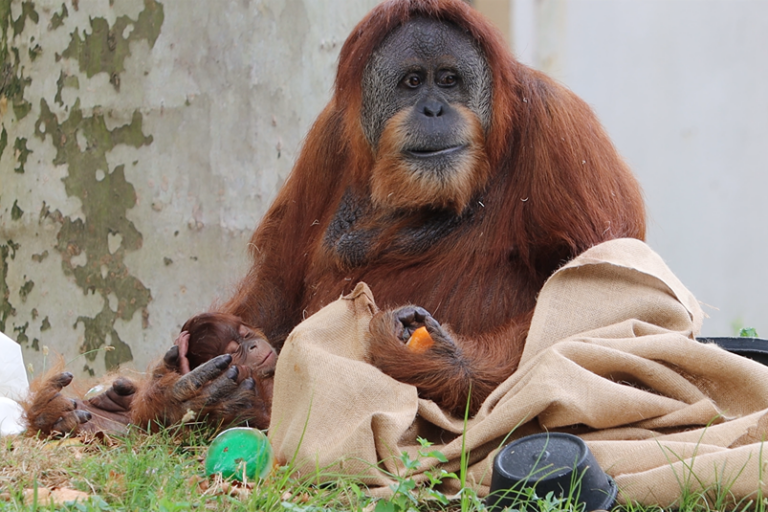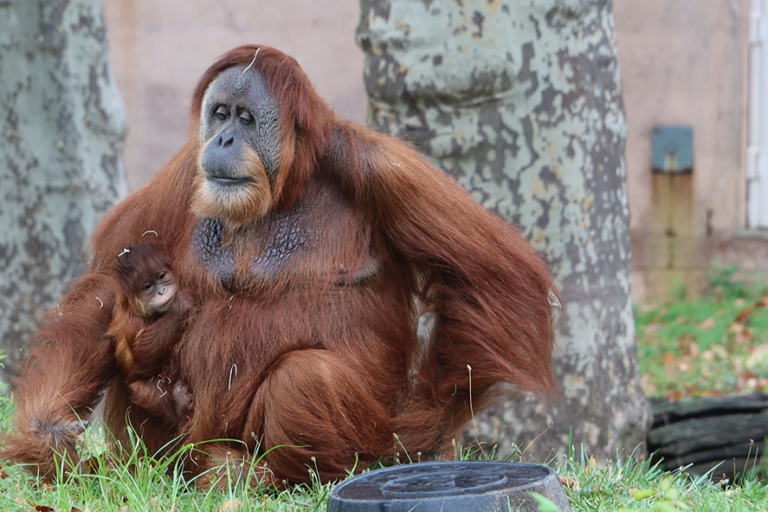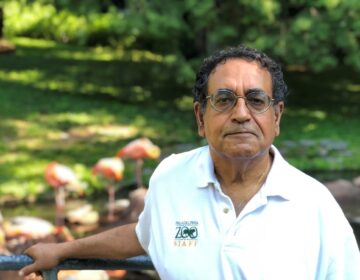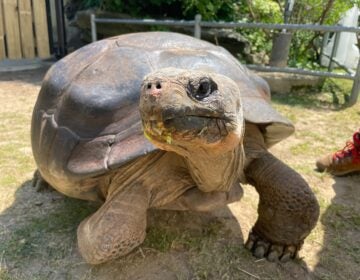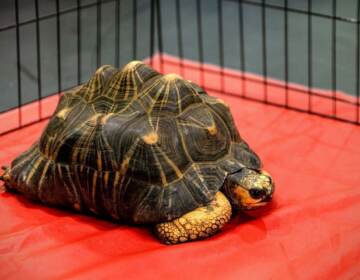Philadelphia Zoo debuts ‘critically endangered’ Sumatran orangutan baby
Jambi, of a critically endangered species specific to a shrinking region of Indonesia, has been promised a “happy, healthy” lifespan.

Jambi, the new baby orangutan at the Philadelphia Zoo. (Courtesy of Philadelphia Zoo)
From Philly and the Pa. suburbs to South Jersey and Delaware, what would you like WHYY News to cover? Let us know!
Clinging shyly to his mother, six-week-old Jambi made his public debut Wednesday morning in the Philadelphia Zoo’s orangutan enclosure. Cameras on the other side of the fence captured every moment between Tua and her son.
There is a lot riding on the little kid, and not just due to his new media celebrity. Sumatran orangutans are listed as “critically endangered” on the International Union for Conservation of Nature’s Red List of Threatened Species, with 13,846 estimated to be living in the wild.
To put that in perspective, imagine attending a sold-out show at the Mann Center where everyone is an orangutan. That would be their entire population.
The species is endemic only to a portion of the Sumatra island in western Indonesia that is about the size of New Jersey, and shrinking. The natural habitat of the orangutan is becoming fragmented due to industrial agriculture and logging.
Breeding them in captivity is a carefully planned process, in coordination with the Species Survival Plan of the Association of Zoos and Aquariums, the industry’s accreditation agency.
“We don’t even consider breeding our animals unless we know there’s going to be a happy, healthy place for that animal to live their entire life, which, for an orangutan, can be 50 or 60 years,” said Michael Stern, the zoo’s curator of primates.
“We also look at the genetics of the animal, to make sure we’re maintaining a genetically healthy population under human care,” he said. “We’re looking at 100 years into the future for that.”
This is not the first time the Philadelphia Zoo fostered the birth of a Sumatran orangutan. Fifteen years ago, Jambi’s parents gave birth to a female, who has since relocated to a zoo in Seattle and will soon give birth and make Jambi an uncle.
Sumatran orangutans are solitary creatures. Unlike other primates like gorillas and chimpanzees who form complex social groups, orangutans tend to live on their own. But this comes only after a long childhood spent with their mothers to learn the ropes of survival.
“Orangutan children have the longest childhood of any species other than people. They’re going to hang out with mom for six or eight years before they move off and get their own territory,” Stern said. “The mother-child is really the only stable social group that you have in an orangutan society.”
For his debut on Wednesday, Jambi — named after a major city on the Sumatra island in Indonesia — stayed mostly tucked away from view under his mother’s right arm as she foraged through food laid out in festive fashion by zoo staff, including high-fiber vegetables and a block of fruit-flavored ice in the shape of a cake.
The orangutan enclosure is shared with other primates who occupy the space on a rotating schedule. Jambi and Tua will promenade publicly at predetermined times, which will be announced in advance on the zoo’s social media channels.
Due to his slow development, Jambi will remain in infant and juvenile states for a longer period than most other animals, allowing the zoo to offer visitors the sight of a baby animal for years to come.
Baby animals are big draws, but zoological best practices encourage zoos to limit breeding.
“Back in the day we used to breed, breed, breed because people love seeing baby animals,” Stern said. “They’re super cute. Every year we’d have a baby lion, a baby tiger, a baby monkey, a baby this and a baby that.”
“Nowadays, we’re much more careful because we want to be sure that those animals are going to have a happy, healthy home for their entire lifespan,” he said.

Saturdays just got more interesting.
WHYY is your source for fact-based, in-depth journalism and information. As a nonprofit organization, we rely on financial support from readers like you. Please give today.



